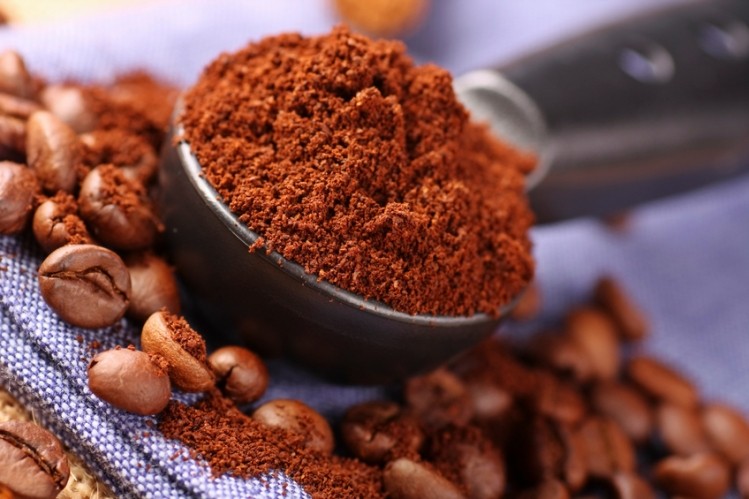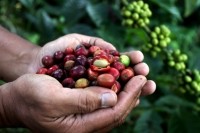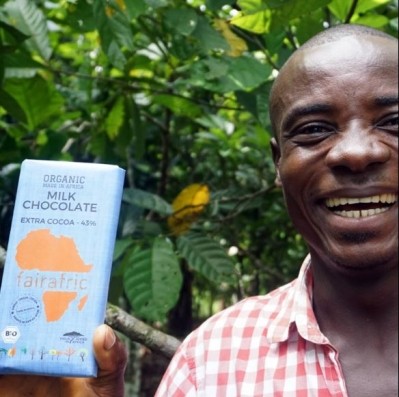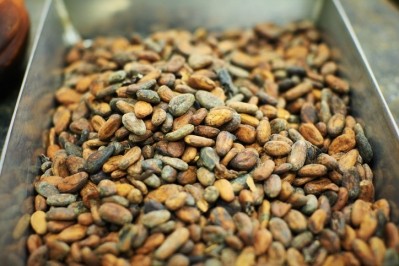'The situation is not sustainable': Is the coffee boom leaving producers behind?

Consumer demand for coffee is rising, buoyed by interest in ready-to-drink formats and millennial uptake.
According to research firm Mordor Intelligence, the global market value of coffee is expected to witness a 5.5% compound annual growth rate through to 2023. “Factors such as the availability of wide-range of coffee type, flavours and brewing styles, rising urbanisation and disposable incomes and increasing number of food outlets, retail stores and cafes are driving the global coffee market growth,” the researchers noted.
At a manufacturer level, the market remains complex and highly fragmented. But it is a sector in consolidation, with the three largest global players – Nestle, Jacobs Douwe Egberts (JAB) and Lavazza hoovering up assets.
In 2017, Nestle accounted for over 22% of global coffee sales, JAB generated 11.5% and Lavazza accounted for 2.5%.
- Source: Bernstein Research
The spate of recent deal-making includes Lavazza’s acquisition of Mars’ coffee business, JAB’s licensing deal with Italian coffee group Illy and Nestle’s licensing agreement to produce Starbucks retail products.
"One of the most important stories in coffee of recent years has been the wave of consolidation. This process looks likely to accelerate, even without further acquisition activity. As the biggest get bigger, second-tier coffee companies find themselves shrinking in importance even as they increase their sales organically,” Euromonitor analyst Matthew Barry explained.
According to Barry, coffee companies with regional or global ambitions must either expand or risk being “swallowed up by their massive competitors”.
A key factor driving M&A activity in coffee is the fat margins on offer. According to analysis from Bernstein, Nestle’s powdered and liquid beverages business enjoys margins of 22% (excluding the new business acquired under Starbucks, which itself has a margin of 24%).
These high margins contrast with the current low price of coffee beans, which have reached a 12-year low, trading at a little over €1 per pound.
‘A deep social and economic crisis’
Coffee beans are produced almost exclusively in the developing world. The current price situation is pushing farmers deeper into poverty, organisations representing producers and fair trade groups warn.
In a joint letter, associations representing coffee farmers in more than 30 countries in Latin America, Africa and Asia urged the industry’s largest organisations to take joint action to address the crisis.
“As the leaders of coffee growers' associations that represent coffee growers from more than 30 countries, we write to you to express our deepest concern with the current situation in the coffee market that is generating a deep economic, social and potentially political crisis, and unrest amongst coffee producers all over the world,” the letter stated.
“Since 1990, coffee prices have been behaving in a way that is every day more and more damaging to farmers, to the point where in many countries they cannot even cover their production costs, let alone make a profit to make a decent livelihood for them and their families.”
The main associations that signed the letter include the Robusta Coffee Agency of Africa and Madagascar, African Fine Coffee Association, Specialty Coffee Association of Brazil, National Coffee Council (Brazil), Colombian Coffee Growers Federation, Inter African Coffee Organization, India Coffee Trust, and Promecafé, which represents Mexico, Guatemala, Honduras, El Salvador, Nicaragua, Costa Rica, Panama, Peru, the Dominican Republic and Jamaica.
There is a need for every link in the chain to be profitable in order for the coffee industry to be sustainable, the associations insisted. While climate change might present a long-term threat to coffee production, in the shorter term economic pressures are also forcing farmers out of business.
“Coffee is at risk, not just for threats such as climate change but, in a more immediate way, the lack of economic sustainability of millions of coffee growers who are paid today less than on third of the price of 1982,” the letter stressed.
Fairtrade France also recently published a report in conjunction with Repenser les Filières calling out the “exploding” value creation in coffee that “does not trickle down to producers”.
According to its findings, the current market for commodities can be linked to issues ranging from climate change and pollution to poverty. For example, in Peru and in Ethiopia, behind every dollar generated by coffee exports, in 2017 there was between 85 and 90 cents hidden societal costs, the report suggested.
"With this level of value creation there should not be a price crisis. It is clear that there is the means for a better redistribution of the value,” said Merling Preza, vice president of Latin American Fair Trade Producers (CLAC). Preza pointed out the apparent dichotomy between companies statements on sustainability and “current conditions, paying less than $1 per pound” of coffee.
"This study reveals a trend we see in many value chains today: a growing and indecent concentration of wealth and power in the hands of consumers, while producers and their upstream workers fall even more in poverty,” added Anna Cooper, coordinator of Repenser les Filières.
What's the answer: price or productivity?
Coffee sold under a Fairtrade logo guarantees a minimum price as well as a price premium for farmers and fairtrade certification organisations suggest that this is an effective way of delivering farmer income.
“Fairtrade is very much part of the solution to addressing the increasing challenges that coffee farmers continue to face. We encourage businesses to engage in conversations and actions that will result in verified positive outcomes and certainties to the farmers,” Anna Pierides coffee supply chain manager at the UK’s Fairtrade Foundation explained.
She continued: "We are proud that through Fairtrade, there is an assurance that the Fairtrade Minimum Price and Premium has been paid to coffee farmers and their cooperatives
"We believe that all players in the coffee industry, and all players in coffee supply chains, should help support and work towards ensuring coffee farmers are paid a fair price. It is everybody’s responsibility in the industry to ensure their sustainable livelihood and future."
Nestle, the world’s largest coffee buyer, also concedes that the situation is “not sustainable in the medium term”.
“The present period of historically low Arabica prices are causing hardship for many coffee farmers. This situation is not sustainable for the coffee sector in the medium term,” a spokesperson for the company said.
However, Nestle does not guarantee a minimum price. “We do not have a minimum price guarantee like Fairtrade but we do offer the most competitive prices in an open marketplace, paying premiums for farmers who supply us with high quality and responsibly sourced coffee,” the spokesperson confirmed.
According to Nestle’s assessment, the most effective way of improving coffee economics is increasing productivity, optimizing production costs and diversifying crops to insulate farmer incomes from volatility in coffee prices.
“Our ambition is to make coffee farming a more attractive economic activity for present and future generations of farmers, improving farmer incomes and livelihoods. Under our sustainability programs, we are working with hundreds of thousands of coffee farmers globally to help increase their productivity,” the spokesperson suggested.
JAB and Lavazza did not respond to requests for comment on their coffee bean sourcing and pricing strategies.


























